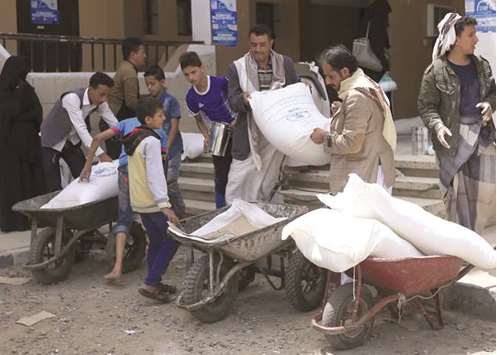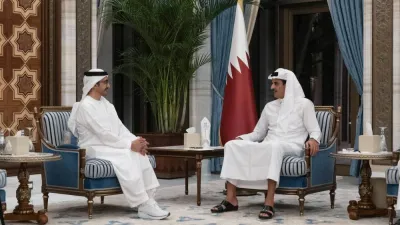The United Arab Emirates (UAE) said yesterday an Arab coalition fighting the Houthis in Yemen was co-operating with a UN envoy to end fighting, but the Houthis must quit the port city of Hodeidah as a condition for any peace deal.
UN envoy Martin Griffiths is visiting the southern city of Aden today for talks with ousted President Abd-Rabbu Mansour Hadi in the exiled government’s temporary capital, after similar talks with the Houthis in Sanaa last week.
The UN is seeking a breakthrough in the three-year-old conflict that has killed more than 10,000 and caused the world’s most urgent humanitarian crisis, with millions facing starvation and disease.
The Houthis control the capital and most populated areas.
The alliance of Arab states led by the UAE and Saudi Arabia has been fighting since 2015 to restore Hadi’s government.
The coalition launched the biggest assault of the war this month on Hodeidah, Yemen’s main port city, and seized the airport last week.
The international community fears the humanitarian crisis could sharply worsen if fighting for the port causes an interruption in aid.
Forces backed by the UAE have been consolidating near the airport before a push to the seaport.
Reem al-Hashimy, the UAE minister of state for international co-operation, told reporters in the UAE capital Abu Dhabi that the coalition was in close contact with UN envoy Giffiths “and we do want to see this come to a positive conclusion.”
But she added: “There are really certain elements we won’t sway from...the withdrawal of Houthis from the city is essential.”
The Houthis have indicated they would be willing to hand over management of Hodeidah port to the United Nations, and Washington has encouraged the Arabs to accept such a deal, Western sources have told Reuters.
However, it remains to be seen whether the Houthis could be persuaded to leave the city.
They have been preparing for battle in urban areas, where the Arab states’ forces would be expected to meet tougher resistance than they have so far.
Residents told Reuters the Houthis are digging trenches, building defence berms and reinforcing their ranks with troops in Hodeidah and in other towns surrounding the city.
“People in the city are afraid to die and their only hope is that the UN envoy will get a peace deal and prevent the war, though nobody is optimistic because of their previous attempts,” said Houda Ahmed, a teacher in Hodeidah city.
Coalition planes kept pounding Houthi-held areas, especially towns surrounding Hodeidah.
Medical sources told Reuters nine civilians were killed and 11 wounded when an air strike hit a bus in the town of Zabid, in southeast Hodeidah.
The coalition did not immediately respond to requests for comment.
Griffiths, the envoy, has succeeded in keeping communication channels open with the Houthi leaders, in a contrast with a predecessor who was accused of dropping neutrality.
Western countries have tacitly backed the Arab states diplomatically, and the United States, Britain and France sell them billions of dollars a year in arms.
But the prospect that a major offensive could cause a humanitarian catastrophe has prompted the Western states to urge caution on their allies.
A conference in Paris on Yemen set for today and jointly chaired by France and Saudi Arabia has been downgraded from the ministerial level to the level of experts.
Neither the Houthis nor aid groups will attend.
French officials said they still hoped for some progress from the Arab states on alleviating the humanitarian situation.
A French diplomatic source said Riyadh had indicated it may be ready to offer some concessions, including allowing more flights to and from the Houthi-controlled San’aa airport, more visas for humanitarian workers and creating one inspection system into the port of Hodeidah.
“Previous discussions make us think that they can go further on this,” the source said.

Yemenis carry sacks of food aid distributed to displaced people, who fled battles in Saada province and other war affected areas in Yemen, at a school used as shelter in Sanaa.


